🔥 These hotties got FIRED from their dream jobs—and wrote a book about it 📚
Oprah, Carol Burnett, Lisa Kudrow, and Jamie Lee Curtis told my friends Kristina O’Neill and Laura Brown how losing jobs made them win. A helpful guide!
I had an out-of-body experience last week. I was leaving a meeting on the west side and strolling through Central Park when I opened up Instagram. Oprah’s latest post popped up—and it stopped me in my tracks.
Is that my friends Kristina O’Neill and Laura Brown? I thought to myself. Sitting at a table with Oprah friggin’ Winfrey? Talking about their new book, All the Cool Girls Get Fired?
Yes, it was!
I got goosebumps. I sat down on a bench and watched the whole video. I was so excited for them that I had tears in my eyes.
The book’s tagline is, “How to let go of being let go, and come back on top.” Part inspirational text, part how-to guide, this book is filled with personal anecdotes from Carol Burnett, Lisa Kudrow, Jamie Lee Curtis, Katie Couric, and yes, Oprah. Kristina and Laura co-wrote it after they were let go from their posts as editors of WSJ. Magazine and InStyle, respectively. Oprah had invited them to her house in Montecito to ask how they landed on their feet and flipped the switch on this defining moment in their lives.
I remember the day Kristina got fired because she texted me from the HR person’s office as the situation was unfolding. It was a total surprise. It was surreal. Only a few months earlier, she hosted her company’s annual awards and welcomed Margot Robbie, Greta Gerwig, Anthony Vaccarello, Kate Moss, Jony Ive, José Andrés, and Laurene Powell Jobs.
Laura lost her job 14 months before Kristina when a new owner acquired her magazine. (It was the tail end of the pandemic, and her entire staff was let go via Zoom.) As a renowned editor who had recently put Zendaya, Dr. Anthony Fauci, and Obama on her covers, she didn’t see it coming either.
Not long after, the two of them met for a drink—erm, or four?—and took a selfie together, which they posted on Instagram with the caption, “All the coolest girls get fired.” That planted the seed for this book, which is OUT TODAY.
I’ll be honest: At first, I couldn’t see a silver lining. When they got fired, I saw a big bowl of lemons—I didn't see any lemonade.
But it’s a testament to how smart and scrappy these two women are to have flipped their scripts. They refused the shame, they devised a plan, and they created a path for other women—and men!—to follow in their footsteps.
Turns out this is a pretty timely topic: the federal government has shed nearly 200,000 jobs this year alone. In 2025, the unemployment rate for recent college grads is hovering around 4.59%, up from 3.25% pre-pandemic. And I’m sure we all know someone on the job hunt right now, wondering if AI is about to steal their job.
That’s why I’m so friggin happy about the interview in today’s newsletter!
Keep scrolling for my chat with Kristina and Laura about their friendship, their tenacity, and the incredible book they wrote knowing other cool girls would face the same thing—and need it too.
Derek: I grew up in a quiet, conservative part of the country where jobs were a necessity. Both my parents worked; they took my brother and me to get jobs when we were 15. How did you guys grow up feeling about employment?
Laura: I was an only child growing up in Sydney, and my Mum and I lived in government housing, so I was desperate to get out there and work. I started at 14, selling sandwiches and ice cream at a beach kiosk. Primarily for my identity—to swim in the same pool as the grown-ups—but obviously also because money, however minimal, gave me independence.
Kristina: I started working at 15, too. My first job was at a clothing store in a strip mall in my hometown, Woodbridge, VA. I worked retail until I was in my 20s. When I moved to New York, I worked at the Gap and at a very cool boutique on Ludlow Street back in the day, TG-170—where I promptly spent every paycheck on Daryl K pants and drinks at Max Fish. While working in retail, I also babysat, interned at Time Out New York, worked at a literary agency, and assisted Candace Bushnell. I was always curious about fashion, but my true passion was journalism.
I grew up feeling like getting fired was a sin. Shameful! Not as bad as a DUI, but not much better either. Did you grow up with a similar sense of guilt about being fired?
Laura: Yeah, on its face, especially years ago, getting fired was a shorthand for “you are B-A-D.” I think only more recently have we grown to understand the nuances of it—especially the crazy acceleration of change that means so many of today’s layoffs aren’t personal at all. Often, you’re just a line item on a budget document that a company needs to cut.
Talk to me about the day you were fired. Do you remember what you were wearing? What were you thinking?
Kristina: Ha! I don’t remember what I was wearing, but I’m going to assume I was trying to look smart because it was the first time I was meeting my new boss. Little did I know that it wasn’t going to be much of a meeting.
Laura, you were on Zoom because it was still the work-from-home era.
Laura: I was about to go out to an appointment with a lawyer. I had jeans on and Nike Air Forces, which I didn’t take off for like eight hours, because I was fielding a deluge of texts and DMs. I remember writing the lawyer an email saying, “So sorry I can’t make it, I’ve just been fired.”
Did you guys cry? I would have cried. I have cried when being fired!
Kristina: A few tears were shed, and even more during the speeches at my going-away party.
Laura: I didn’t, actually. I think shock can be an armor.
How did it feel when in the moment?
Kristina: My first response was guilt because I had people and places that depended on me having that job, like my kids’ caregiver, tuition bills, rent—that kind of stuff. But what I didn’t want to feel was shame. That’s why I was so honest about what had happened to me right from the start. The HR team said “they’d follow my narrative,” which I took to mean that they’d back me if I wanted to say I was quitting or leaving on my own. But I didn’t want to lie. I said, Nope: I. Was. Fired.
Laura: I think a lot of the trauma of losing your job, kind of like a breakup, is being yanked out of your rituals and habits. There is a comfort in having a routine, and when that goes away, that can be hugely destabilizing—not to mention losing a salary and health insurance.
“This is the whole purpose of the book: lose the shame, lose the spin, own it, and move on.”
Was the famous meeting when Laura posted a selfie of you two with the caption, ‘All the coolest girls get fired,’ the first time you had seen each other since Kristina was fired?
Laura: I was in South Africa when Kristina texted me that she’d been canned, and I’d just gotten back when we met for drinks. I remember being off my head with jetlag, but slow-mo going, “I…have…to…be…there…for…my…friend.” And we knew the wine would be good.
Kristina: Wine is always good! But yes, it was the first time I had seen Laura in person, although we had been in constant contact. I actually texted her from under the table, where I was still with HR, to say I was getting the boot.
Some of your friends told you to take the post down. I admit I was one of them! It was because of the aforementioned inherited guilt about being fired, of course. How did that make you feel?
Laura: Yes, I know Kristina had some of that incoming, especially because her firing was more recent than mine. But what was clear for both of us was the ownership of what had happened. Ownership is what we all work toward, and we wanted to be honest. We were good at our jobs, yet we were still fired.
Kristina: Now, here we are, the poster girls for getting fired!
Laura: It wasn’t a reflection on our abilities. We knew that in our gut. But yes, we absolutely could see how radical it was in retrospect. We are so conditioned—especially in this industry, fashion media—to look like we’re gliding on a pond. But sometimes you sink, and that’s OK! The faster you admit it, the quicker you get back up.
How do you get from those drinks to the book deal?
Laura: We both went home and sat staring at the wave of comments coming in on that post.
Kristina: It was clear we’d touched a nerve.
Laura: Turns out, this is the essence of how Kristina and I work together—I come up with the big headline and she comes in with execution. The day after our drinks, she called me and said, “LB, this is a book.”
I don’t want to get sidetracked, but you have to tell me what it was like to film at Oprah’s house in Montecito.
Laura: Oprah’s home is like a dream sequence. All the roses are perfect. And what a team! It’s a really fluid, on-point process. And it wasn’t intimidating: the blessing of Oprah is that she makes everybody comfortable immediately—like a conversational hug.
Kristina: For me, it was out of body! It’s everything you’d think it is—and more. She runs a well-oiled machine: when you arrive, you already feel so tucked in and ready to go. The best part is just how invested she is in who she’s talking to. She had read and annotated the book and was prepared to talk about it. It obviously helped that she, too, had been fired once.
I’m not a cool girl, but I have been fired. The idea of you two reclaiming the narrative and flipping the “I’ve been fired” narrative on its head was very inspiring to me. Cool girl power! [I’m saying this with a Spice Girls voice].
Laura: It has certainly… Spiced up our life?
Thank you for that.
Laura: We wrote the book proposal at Kristina’s dad, Larry’s, 70th birthday party in Virginia in summer ’23. We sat on the couch for 10 hours. It’s been such a great process: we have different rhythms, and one of us will automatically fill in for the other when one is busy. One thing we know how to do is put together a magazine, so we approached it that way. But with a hell of a lot more words.
Kristina: The book we outlined in the proposal is the book we delivered. From there, it was about plugging in all the different elements: reporting out the service chapters, with help from the genius Jessica Goodman; synthesizing everything into a cohesive whole; tracking down and interviewing all the women; and, of course, weaving in our own narratives. There were plenty of late nights and weekends hacking away. The best part was spending four nights at Hotel Il Pellicano in their writers-in-residence program, where we finished the book.
Tell me about the subjects in the book. My mind was blown when I read that Lisa Kudrow was fired from the Frasier pilot. I loved Friends, of course, and can’t imagine the show without her. But I also loved Frasier, and can’t imagine her playing Ros! What were your mind-blowing moments when you were working on the book?
Laura: Lisa’s story is so crazy because it’s all fate. Well, skill and fate. The same director, James Burrows, who fired her from Frasier, hired her on Friends—and the rest, as they say, is history.
Kristina: I was shocked that the wildly impressive sports agent Lindsay Colas was fired by a client the day after Brittney Griner was freed from prison in Russia. Lindsay had worked tirelessly to secure Brittney’s release, and yet another client felt she hadn’t paid her enough attention and fired her. Like, don’t you want the agent who can get you out of a Russian prison?!
Laura: Jamie Lee Curtis is in the book because she mentioned being fired in one of those SAG Awards audience monologues. Tarana Burke, the founder of #MeToo, had told me she’d been fired from an arts organization in Philly, so I called her. Angela and Margherita Missoni put their hands up in the comments section! Perhaps my favorite, though, is Carol Burnett. My friend Laura Dern—who is on the show, Palm Royale with Carol—told me a crazy story about a “friend” who was fired from a movie theater in the 1950s and then, 25 years later, asked to have her Hollywood star placed in front of it. Only at the end of the story did she say it was Carol. My conversation with Carol was such a privilege: I was so moved by her lack of cynicism.
“While we were reporting the book, I was moved—and at times stunned, outraged, angered, and saddened—by some of the stories we heard.”
Which one of you cried when interviewing Oprah?
Kristina: I can confirm I shed some tears. But she was emotional too! I was struck by her total recall of her firing, as if it happened yesterday. She still carries those feelings, which was such a humbling and powerful reminder that no matter how high you soar afterward, the sting of being fired never entirely disappears.
Laura: Oprah’s memories of the passive-aggression and racism she was subjected to as a 22-year-old news anchor were heartbreaking and remain upsetting for her. But one of my favorite quotes comes from Sallie Krawcheck, a fearsome New York banker who has been fired twice. She was super blunt: she said stop obsessing about what people are thinking or saying about you when you’re fired: “At the end of the day, nobody else cares.”
Did you cry with anyone else?
Laura: I did not. Am I dead on the inside?
Kristina: I’m such a softie. While we were reporting the book, I was moved—and at times stunned, outraged, angered, and saddened—by some of the stories we heard. I felt all the feelings all the time.
Was there anyone who declined?
Laura: Oh, yes, we asked a few well-known women who we know had been fired, or not cast or chosen for a role. Some still won’t admit it. This is the whole purpose of the book: lose the shame, lose the spin, own it, and move on. Maybe they’ll admit it after publication.
Kristina: Maybe we’ll do a sequel?
When you told me about the book, I assumed it’d be all feel-good stories about famous women who had been fired and then climbed their professional mountain tops. But it’s packed with practical info too. Like, ‘what the fuck is COBRA?’ In your own experience and from the experience of those you’ve spoken to in this process, what has been the most complex process in being fired?
Laura: Goddamn COBRA. I got physically angry while writing the health care chapter. Yes, for me, it was the vulnerability you feel without having health care. And I am, by most definitions, a successful woman. We wrote in the book: “How is it acceptable that in the United States, when you lose your job, losing your health care is one of your most urgent fears?”
Kristina: Money! Beyond the obvious financial strain of suddenly losing your paycheck, it’s the ripple effect that makes the process so complex. Severance negotiations, figuring out how long you can float without a steady income, the cost of health care—it all hits at once, and usually when you’re least prepared. Even for women with successful careers, the uncertainty around money is both destabilizing and humbling.
What’s the one thing everyone should do now if they have a job?
Laura: Always pay attention to what’s happening in your industry. Don’t be paranoid, but be aware. Things are changing at warp speed, and you don’t want to feel like you don’t have agency or control. The most important thing is not to attach all of your value to your work. Of course, we all do, to some extent, but if you attach too much, when you lose it [your job] you will… lose it.
Kristina: Yes, yes, all of that, for sure. But there are some simple things you can do along the way when you have a job—every couple of months, back up your contacts and update your LinkedIn profile. And think twice about tapping your phone at Starbucks. Maybe that $6 latte would be better invested in a compounding savings account?
What’s the one thing everyone should do if they get fired after they read this interview?
Kristina: Write everything you achieved in that job down while it’s still fresh. The extreme emotions you may be feeling—shame, anger, humiliation—can cloud the fact that you actually did outstanding work. So give yourself time to sit with it, reflect, and remind yourself of the wins. That list becomes a touchstone for your confidence and a roadmap for what comes next.
Laura: Own it! Take some time. Of course, how much time you have depends on your financial circumstances, but we all have some. My favorite and most empathetic advice in the book is from The New York Times’ money columnist, Ron Lieber. He says, “The best thing you can do for yourself is take a week off—or even just a day—and think about what work made you most happy and least happy over the course of your career. What could you do next time to increase the happiness and decrease the unhappiness?” It’s like math for your dreams.
When a friend gets fired, what’s the right thing to say to them?
Kristina: The last thing you want to hear is, “This will be the best thing that has ever happened to you!” You need to come to that conclusion yourself. The most helpful thing was hearing from people who just wanted to check in, make sure I was hanging in, like a little mental-health check.
Laura: Keeping the normal rhythms with your friends is so important. While you know people care, it does get wearing to keep answering, “Are you OK?” I found something between day-to-day consistency and your friends saying, “F them!” the most comforting.
This book destigmatizes losing one’s job. What else do you hope readers get out of this book?
Kristina: For me, it’s about perspective. Being fired can feel like the end of the world in the moment, but it’s often the thing that cracks you open to what’s next. If readers finish the book feeling less alone, less ashamed, and maybe even a little emboldened to take their next step—that’s the win. Because the truth is, it’s not a scarlet F. It’s a rite of passage.
Laura: Exactly that. I’ve had ladies come up to me on the street or in restaurants telling me they’ve been fired. I give them a high-five and say, “I knew you were cool!” They light up. And damnit, that’s what makes me cry.
Thank you for reading all the way to the bottom.
Don’t forget—All the Cool Girls Fired is on sale TODAY! Check out your local bookstore or your favorite online marketplace.
Please like and comment on this post, and tell all your friends about your favorite new Substacker!
Have you been fired? Tell me all about it! Maybe I’ll write about the time I was fired. (Well, one of the times I was fired.)
Until next time, stay safe and chic,
Derek C. Blasberg
PS. AND ANOTHER ANOTHER THING: Kristina and Laura worked together at Harper’s Bazaar for more than a decade, and both were my editors at that time. I’m proud of many of the stories we did together, including my epic profile of Daphne Guinness, which I already took out of the archives. But one of my all-time favorites, which Laura edited, was my first cover story on Lady Gaga in 2011. Remember when she went through that phase with the horns on her face? (Below.) I wrote that story—maybe I’ll get that out of the archives next.



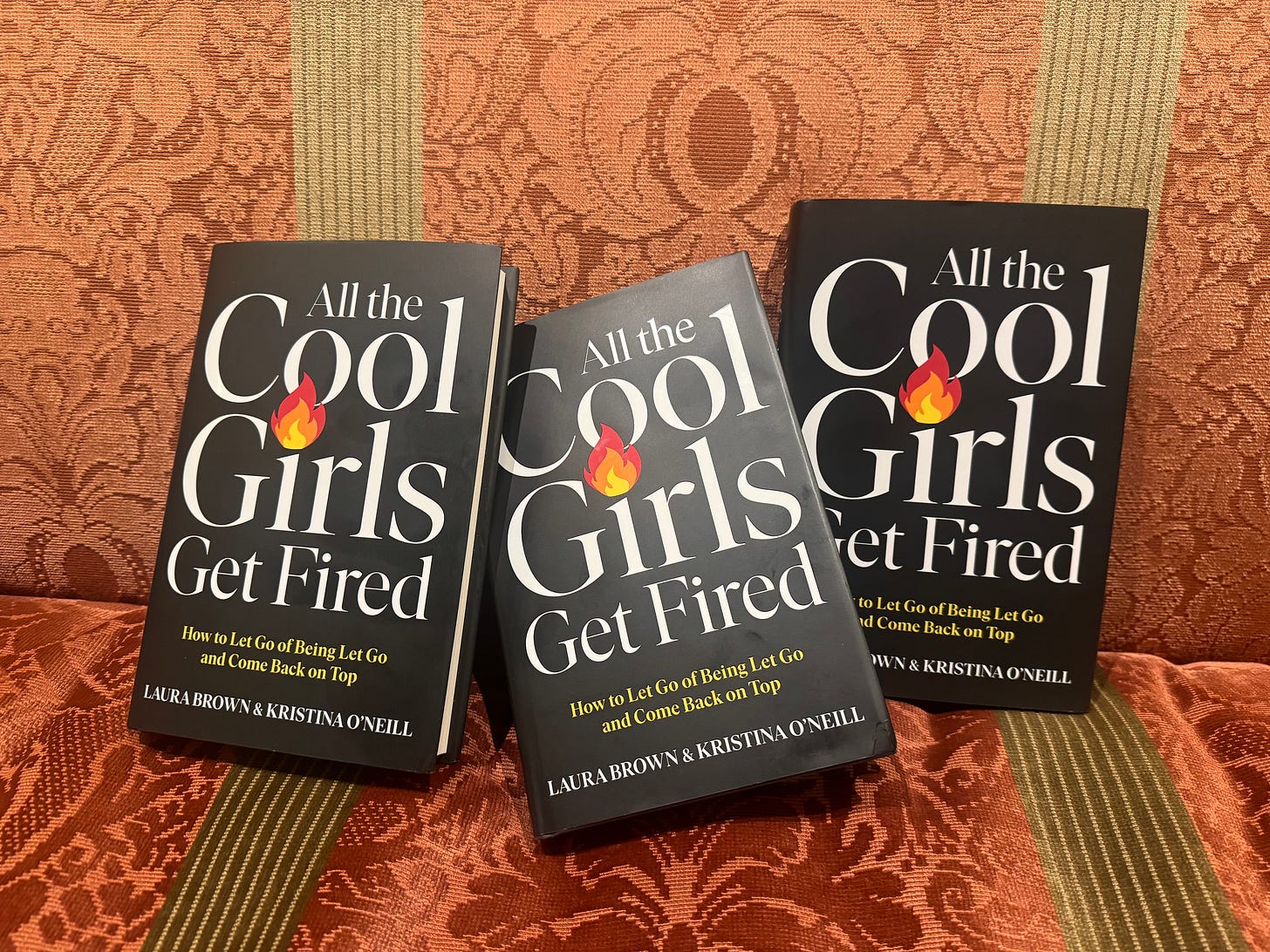
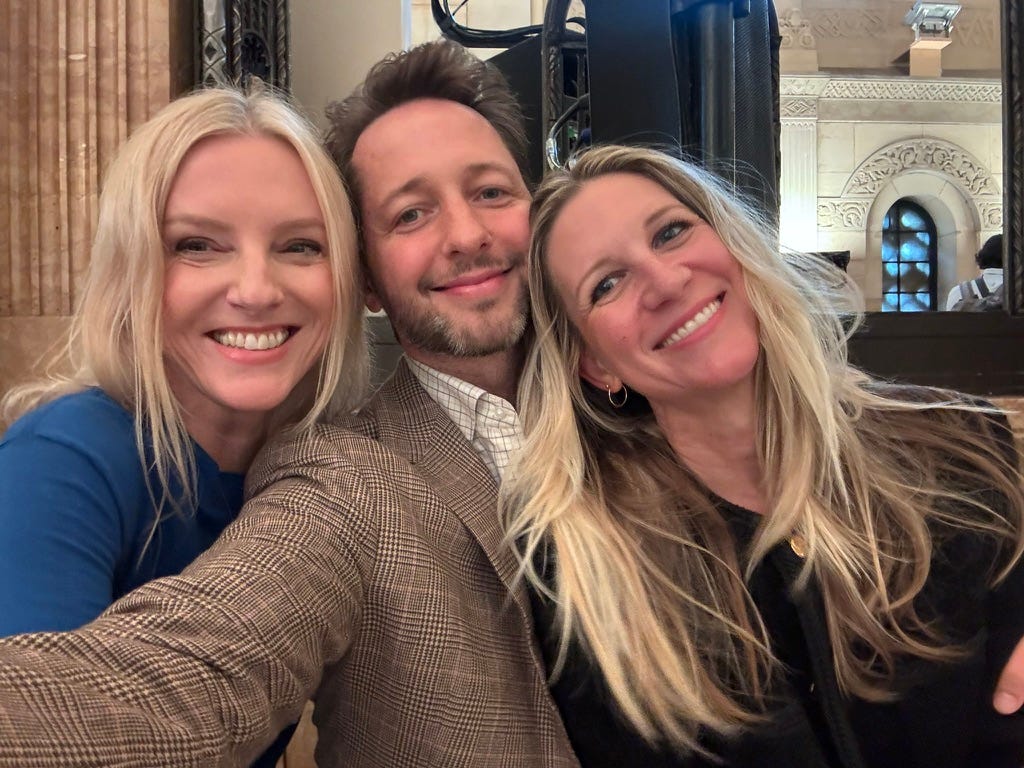
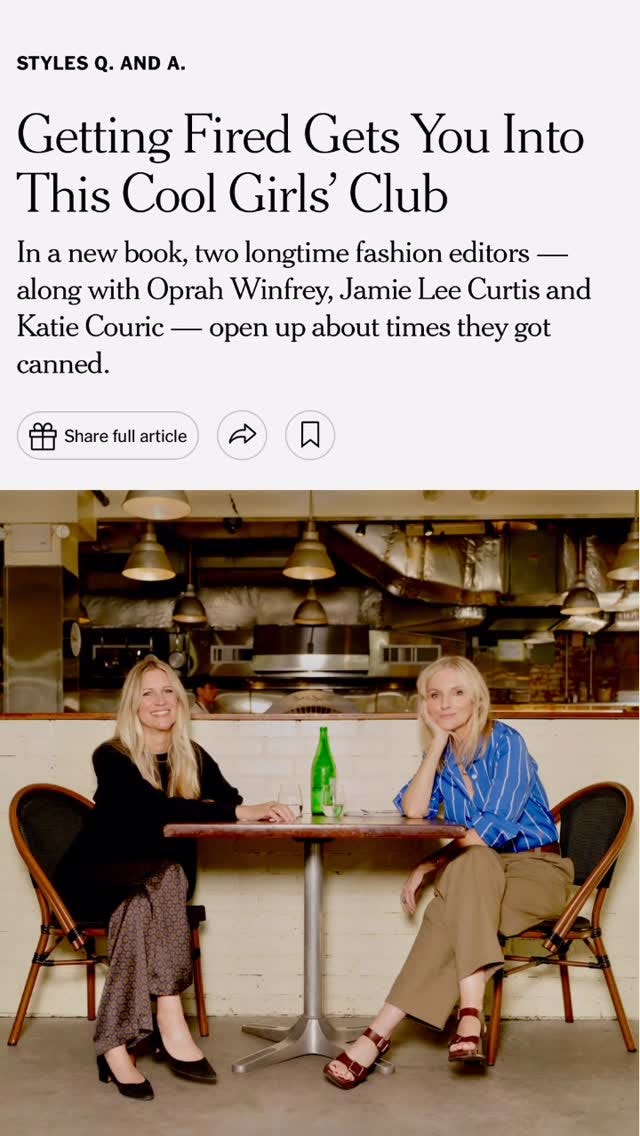
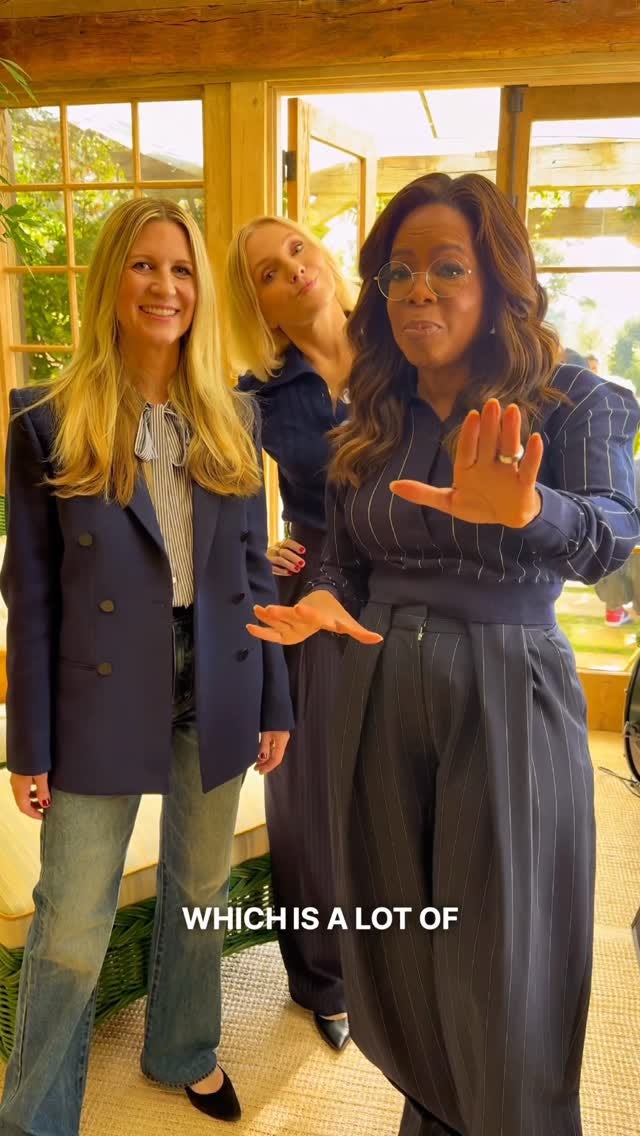

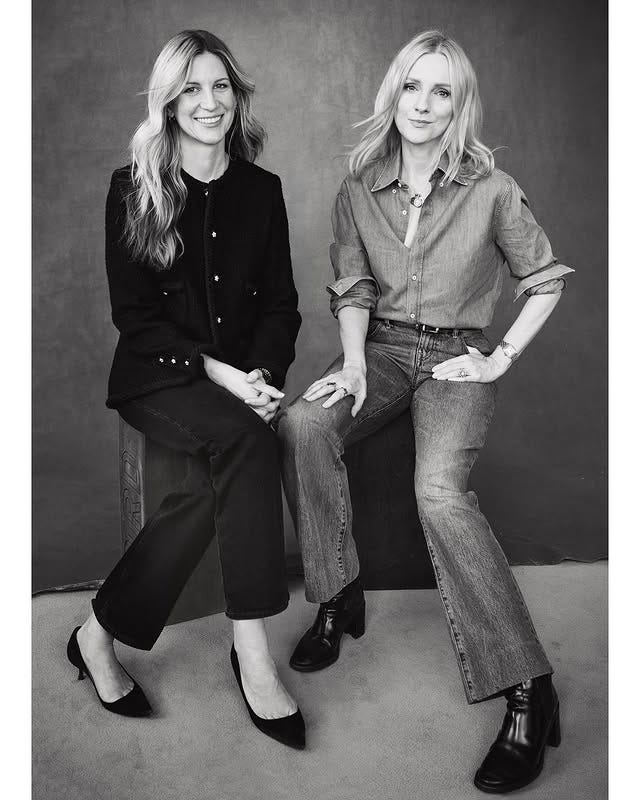
Can't wait to read this! I was fired in August and have been waiting for this to come out (and trying to feel cool in the meantime!)
I can't wait to read this book!